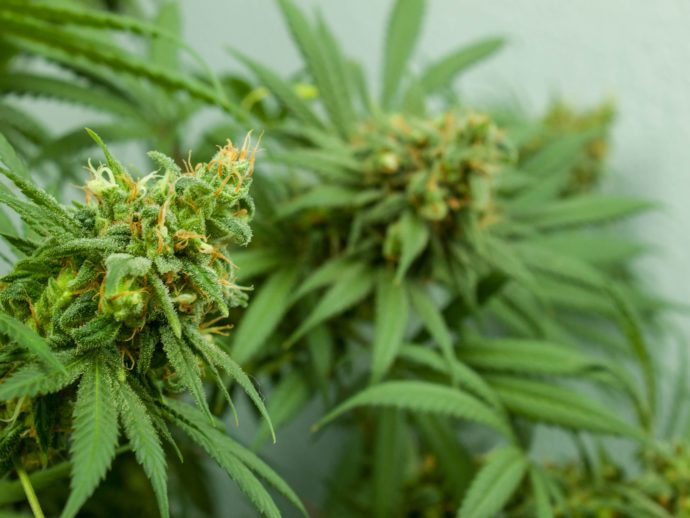
It’s hard not to feel just a touch overwhelmed these days, what with pandemics, climate crises, and political upheaval. But where there is crisis, as the saying goes, comes opportunity. Shifts are emerging as businesses, governments, individuals, communities, and cultures are pivoting to a new reality.
Imagine on the other side of these crises is an ecotopia of plant-based fuels, bioplastics, regenerative agriculture, effective natural health products, and sustainable industries. We can all get behind that, and we can all make it happen.
CBD … and so much more
One of the many products derived from the <Cannabis sativa> plant that’s causing so much anticipation is CBD—cannabidiol, its nonpsychoactive component. While CBD may be taking the spotlight thanks to its potential health benefits, the versatile hemp plant (a cannabis plant that contains no more than 0.3 percent tetrahydrocannabinol, or THC) can produce a wealth of other products.
“There has been so much excitement around CBD,” says Annie Rouse, a hemp industry expert. “But there is much more that the hemp plant can offer—in the areas of grain for food, feed, and industrial oils; fibre for biomaterials; and cannabinoids for wellness, of which CBD is just one of more than a hundred.”
Figuring out how to use the entire plant for the grand trifecta of grain, fibre, and flower is the work of seed geneticists, farmers, and hopeful start-ups.
“Hemp has the potential to replace many products that utilize petroleum, corn, soy, cotton, or timber, whether that’s CBD [from the flowers], protein powder from the seeds, or ingredients from the stalks for paints or building materials,” says Morris Beegle, an American hemp promotor and president of We Are For Better Alternatives, or WAFBA.
“If you look across the spectrum at what all those commodities produce, hemp can theoretically compete, with a more environmentally friendly ingredient than those other options.”
What’s more, hemp can wed the romantic with the scientific by saving small towns while helping the climate crisis.
This plant is one of the things that is going to make a difference,” says Michael Bowman, hemp farmer and advocate. “[If] these little towns get five or six families back, it really does make a difference. It’s a way to bring them back and make them excited.”
And there’s a lot to be excited about. While hemp doesn’t sequester as much carbon dioxide as trees, it does make an energy-efficient crop with positive carbon sequestration effects. Hemp roots, Bowman says, store carbon in the soil. Buy a hemp shirt and store carbon in your closet. Build a house with hempcrete insulation, a biocomposite made primarily from limestone and hemp, and store carbon in your house.
Hopeful hemp
It’s a tall order, of course. Entrenched interests have a way of sticking around. Governments can key that change. In Europe, an EU mandate on sustainability has incentivized car makers to use hemp instead of petroleum plastic for interior door panels and dashboards.
“If you and I get on the phone in 10 years and hemp fibre is not a huge part of the materials world,” says Josh Hendrix, a hemp grower and industry advocate, “I’ll be shocked.”
In between the acute crisis of today’s pandemic and the ongoing crisis of climate change is an opportunity to see the broken systems of the past shift toward a more balanced future for everyone involved. Hemp can be a vehicle for this change.
“Hemp can fulfill its grand economic, environmental, and societal impact on the world,” says Patrick Rea, who runs a venture fund and business accelerator in the cannabis industry. “It won’t happen overnight, but it will happen. Business is a great agent of social change, and hemp will be a great business.” [END]
Canadian Hemp Trade Alliance hypes hemp
Canada’s hemp industry has been steadily increasing in importance since its resurgence with the 1998 legalization of commercial production. In 2003, the Canadian Hemp Trade Alliance (CHTA) was established and now represents more than 250 farmers, as well as processors, manufacturers, researchers, entrepreneurs, and marketers in Canada’s hemp industry.
The CHTA is Canada’s primary promoter of hemp for nutritional and industrial applications through the dissemination of information and coordination of research. It’s been an integral organization in establishing the hemp industry in Canada.
The organization has also been a leader in legitimizing hemp on an international level via its collaboration with ASTM International, the American Society for Testing and Materials. The two are helping facilitate the development of industry standards that every mature agricultural commodity crop requires for widespread acceptance and use.
“CHTA’s expertise in industrial hemp is well known,” says Ralph Paroli, PhD, the cannabis committee chair and director of R&D in measurement science and standards at the National Research Council of Canada. “CHTA’s engagement in the committee will strengthen ASTM International’s renowned global standards, specifically in the development of standards for industrial hemp.”
Industrialists can use stem fibres to make papers, fabrics, ropes, and construction materials, while the seeds can be used for the manufacture of foods, cosmetics, plastics, and fuels. The flower has another well-known use: for its health-promoting cannabinoids like CBD.
“With research already underway for hemp animal feeds, the CHTA is servicing their farmers,” says Annie Rouse, a hemp industry expert, “by helping open further grain markets, which supports demand and expands the market.”
While most Canadian hemp is grown for industrial use, some of Canada’s hemp farmers are harvesting the leaves and flowers to sell to licensed processors who mine them for their cannabidiol (CBD).
The lines are still blurred on the selling of CBD in Canada, with only licensed producers and registered retailers being able to sell it, but this is a promising area of growth and opportunity for Canada’s hemp industry—with plenty of room for improvement and education.







